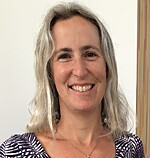We are delighted to bring you the second webinar in our series, Cancer and the Environment: Science and Opportunities for Prevention. This webinar featured presentations on the carcinogen hazards associated with occupational chemical exposures, nitrates in drinking water, and air pollution. Dr. Alexandra White began the webinar with a presentation of findings from her study on air pollution and breast cancer. In this large prospective Sister Study cohort, Dr. White and colleagues evaluated whether heterogeneity in air pollution by both geographic region and particulate matter composition was related to breast cancer risk. This study used an innovative covariate-adapted k-means clustering approach to evaluate particulate matter composition profiles and was the first to consider simultaneous exposure to multiple correlated particulate matter components in relation to breast cancer risk.
Next, Dr. Alexis Temkin addressed the topic of nitrate ingestion from drinking water, which has been associated with an increased risk of colorectal cancer as well as adverse birth outcomes and several other cancers. Dr. Temkin presented research using a comprehensive assessment of nitrate exposure from drinking water for the entire United States population from 2010-2017. Researchers calculated the estimated annual nitrate-attributable cancer cases in the United States and the associated economic losses due to medical costs and lost productivity. The health and economic analyses presented here suggest that lowering exposure to nitrate in drinking water could bring economic benefits by alleviating the impacts of nitrate-associated diseases.
To conclude, Elana Silver presented a new online tool, Working Women at Risk, which is intended to help researchers and advocates to visualize the exposures to chemicals that might be putting California’s working women at risk for breast cancer. The tool is part of a project exploring working women’s risk of breast cancer that is funded by the California Breast Cancer Research Program at the University of California, and supported by occupational health experts at the Public Health Institute, the California Department of Public Health, and the University of California San Francisco.
Featured Speakers
 Elana Silver, MS, is Principal Consultant at Laurelton Research, which provides public health planning, analysis, and education services for clients including biotech companies, universities, community-based organizations, and government agencies. Elana works in a wide variety of subject areas, with an emphasis on environmental and genetic epidemiology. She specializes in translating complex information into a form that can be more easily understood. She provides epidemiological support for the Women’s Occupations and Risks from Chemicals(WORC) project and also facilitates the WORC Advisory Committee. In addition, Elana recently collaborated with the California Department of Public Health on e-cigarette research and outreach, including a recent publicationon monoamine oxidase inhibitory activity of flavored e-cigarette liquids, an online CME course for doctors, and educational materials for the general public. On the genetic epidemiology side, she works with several biotech companies to provide customers with actionable information about their genetic susceptibility to disease and how their genes can affect their response to medications. Elana received her Master’s degree in epidemiology from UC Berkeley and lives in Oakland, California.
Elana Silver, MS, is Principal Consultant at Laurelton Research, which provides public health planning, analysis, and education services for clients including biotech companies, universities, community-based organizations, and government agencies. Elana works in a wide variety of subject areas, with an emphasis on environmental and genetic epidemiology. She specializes in translating complex information into a form that can be more easily understood. She provides epidemiological support for the Women’s Occupations and Risks from Chemicals(WORC) project and also facilitates the WORC Advisory Committee. In addition, Elana recently collaborated with the California Department of Public Health on e-cigarette research and outreach, including a recent publicationon monoamine oxidase inhibitory activity of flavored e-cigarette liquids, an online CME course for doctors, and educational materials for the general public. On the genetic epidemiology side, she works with several biotech companies to provide customers with actionable information about their genetic susceptibility to disease and how their genes can affect their response to medications. Elana received her Master’s degree in epidemiology from UC Berkeley and lives in Oakland, California.
 Alexis Temkin, PhD, joined the Investigations Science team at the Environmental Working Group in November of 2017 and conducts toxicology assessments of drinking water contaminants and ingredients in consumer products. She earned her bachelor’s degree in biological sciences from Connecticut College in 2010, then began her research career at Columbia University Medical Center, as a lab technician studying the molecular mechanisms responsible for environmental influence on gene regulation. She then moved to Charleston, S.C., to attend the Medical University of South Carolina, where she earned a Ph.D. in marine biomedicine and environmental sciences. She studied how exposure to environmental chemicals during development can influence adult disease, specifically obesity and metabolic syndrome.
Alexis Temkin, PhD, joined the Investigations Science team at the Environmental Working Group in November of 2017 and conducts toxicology assessments of drinking water contaminants and ingredients in consumer products. She earned her bachelor’s degree in biological sciences from Connecticut College in 2010, then began her research career at Columbia University Medical Center, as a lab technician studying the molecular mechanisms responsible for environmental influence on gene regulation. She then moved to Charleston, S.C., to attend the Medical University of South Carolina, where she earned a Ph.D. in marine biomedicine and environmental sciences. She studied how exposure to environmental chemicals during development can influence adult disease, specifically obesity and metabolic syndrome.
 Alexandra J. White, PhD MSPH, is a Stadtman Investigator in the Epidemiology Branch at the National Institute of Environmental Health Sciences. She leads the Environment and Cancer Epidemiology group and her research aims to identify novel and modifiable environmental risk factors for cancer. Dr. White received her PhD and MSPH from the Department of Epidemiology in the Gillings School of Global Public Health at the University of North Carolina at Chapel Hill. Follow her on twitter at @ alexandrajwhite.
Alexandra J. White, PhD MSPH, is a Stadtman Investigator in the Epidemiology Branch at the National Institute of Environmental Health Sciences. She leads the Environment and Cancer Epidemiology group and her research aims to identify novel and modifiable environmental risk factors for cancer. Dr. White received her PhD and MSPH from the Department of Epidemiology in the Gillings School of Global Public Health at the University of North Carolina at Chapel Hill. Follow her on twitter at @ alexandrajwhite.
This webinar was moderated by Karen Wang, PhD, director of CHE. It lasted for 70 minutes and was recorded for our call and webinar archive.
